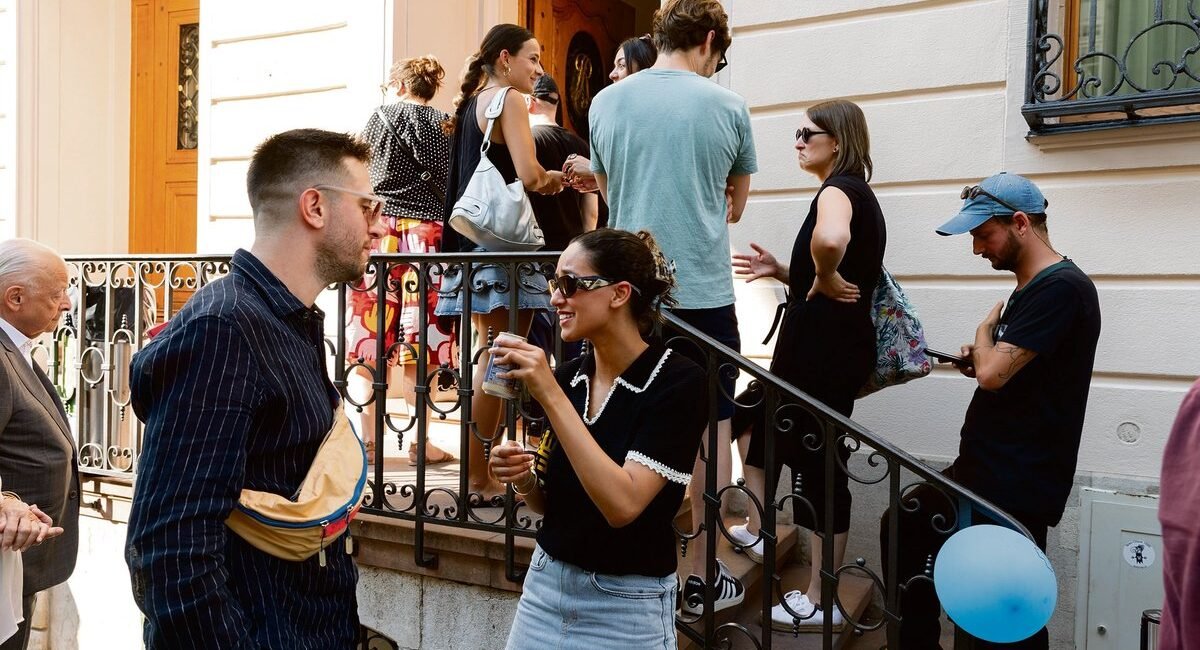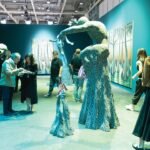The number of satellite selling events in Basel is growing, as dealers respond to an ever more overcrowded field by offering alternative modes of engaging with art.
The latest is Maison Clearing, a pop-up group exhibition by the New York and Los Angeles-based Clearing gallery. Staged across a peeling, four-storey villa in central Basel, the show presents work by 46 artists—most of whom are not signed to the gallery—including Kayode Ojo’s polished chrome sculptural assemblages for $20,000, and Jasmine Gregory’s $12,000 pyramid of stained canvases. In the attic, an aluminium-and-glass statue by Jean-Marie Appriou, for $90,000, gazes eerily back at visitors. Maison Clearing’s unstructured layout and informal domestic setting befits its relaxed, convivial atmosphere. Spilling out onto the south-facing lawn, visitors can be seen chatting, sipping Riesling and nibbling wurst in the sunshine.
“I would much rather be here than at the Messeplatz. People aren’t in the mood to be at a fair right now,” says Olamiju Fajemisin, Clearing’s new director of programmes, who curated the exhibition. She explains that Olivier Babin, Clearing’s co-founder, discovered the villa on the online travel agency Booking.com. The entire house costs $2,000 a day, or $14,000 for the entire week—around one-third the price of a medium-sized stand at Art Basel, and for considerably more space. Babin declines to comment as to whether the gallery, which has taken part in previous editions of Art Basel (and recently restructured following the departure of his Brussels-based business partner Lodovico Corsini) was accepted into the 2025 edition of the fair.
“This is the art experience collectors want,” Fajemisin says. “While the offsite gallery show is not a new concept, the market is in a weird place and we all need to adapt.” She says that the villa is due to be demolished at the end of the summer, adding an element of impermanence and urgency to the proceedings.
Hair stylist, blood bank—and art
A more established art fair alternative, taking place at a much greater scale, is found in Basel Social Club (BSC), the roving selling platform that takes place during the fair week. Following previous iterations in a villa, a mayonnaise factory and a 50-acre farm, the fourth edition sees it move to a large historic building near the Kunstmuseum that was recently home to a private bank.
Filling more than 100 spaces, from cramped cellars to grand parlour rooms, with art, happenings and hospitality offerings, BSC’s densest version to date is a dizzying array of art. Along with paintings from emerging names priced in the low thousands are works with serious institutional heft: Anthea Hamilton’s performance The Squash gets its first outing since its debut at Tate Britain in 2018. Meanwhile, the Swiss gallery Larkin Erdmann has brought a selection of photographs and assemblages by Man Ray. Retaining its sliding-scale participation system, the invite-only BSC costs dealers from £10,000 to nothing to take part, depending on the age of their gallery.
Free to enter, BSC continues to draw a wide cross-section of visitors. At night, local students, exhausted dealers and ambitious artists rub shoulders in the courtyard or sweat in the basement-turned-nightclub. Upstairs in the daytime, American mega collectors Don and Mera Rubell were seen admiring a sculpture by the late Eva Aeppli—a discovery for them both.
We thought this would be an opportunity to have a self-conscious conversation about art’s role in systems of value and exchange
Yael Salomonowitz, Basel Social Club
This year’s BSC also hosts a number of artist-led services, from a hairdresser brought by the London gallery Harlesden High Street, to a beauty nail technician and even a blood bank. “Considering the setting in a bank, we thought this would be an opportunity to have a self-conscious conversation about art’s role in systems of value and exchange,” says BSC’s co-founder Yael Salomonowitz.
In BSC’s vault, the Zürich gallery Suns.works has installed a jewellery store in which it offers a selection of vintage rings and necklaces. The gallery’s founder Lorenzo Bernet has just launched a new alternative art fair, Gallery House, that took place earlier this month in Zürich.
“I have no idea if it will achieve anything, but right now we are going through an identity crisis,” Bernet says. “People are very unsure of current business models. But you can either hide in a hole for the next three years and hope people remember you, or you can keep trying new things, in the hope that something eventually will work.”




No Comment! Be the first one.